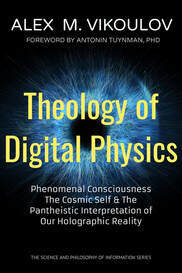The Holographic Paradigm: The Physics of Information, Consciousness, and Simulation Metaphysics
by Alex M. Vikoulov  “It from bit. Otherwise put, every 'it'... derives its function, its meaning, its very existence entirely... from the apparatus-elicited answers to yes-or-no questions, binary choices, bits.” —John Archibald Wheeler
“It from bit. Otherwise put, every 'it'... derives its function, its meaning, its very existence entirely... from the apparatus-elicited answers to yes-or-no questions, binary choices, bits.” —John Archibald Wheeler
I’ve long maintained that what we call “reality” is not some inert, mind-independent substrate but rather a dynamic, information-based process — a computational architecture of consciousness. In Theology of Digital Physics: Phenomenal Consciousness, The Cosmic Self, and The Pantheistic Interpretation of Our Holographic Reality , I explore the provocative idea that our universe may, in fact, be a form of divine code — a cosmic simulation imbued with consciousness at every level. This is not mere metaphor. Increasingly, both physicists and philosophers are recognizing that what lies beneath the physical is not “stuff” in the classical sense, but information — encoded, processed, and rendered into phenomenal experience by what I argue is a Cosmic Mind.
 At the core of this perspective is the Holographic Principle, a theory in modern physics suggesting that our three-dimensional world is, in some fundamental sense, a projection from a two-dimensional boundary — akin to a digital hologram. To me, this doesn’t just describe a scientific abstraction; it evokes the sacred. What if what we perceive as spacetime, matter, and energy are but expressions of a deeper algorithmic order — an experiential matrix that is consciously rendered? The code, in this view, is not cold and mechanical, but luminous and divine — a Multi-Ego Pantheistic Solipsism where every subjective perspective is a localized node of the universal mind.
At the core of this perspective is the Holographic Principle, a theory in modern physics suggesting that our three-dimensional world is, in some fundamental sense, a projection from a two-dimensional boundary — akin to a digital hologram. To me, this doesn’t just describe a scientific abstraction; it evokes the sacred. What if what we perceive as spacetime, matter, and energy are but expressions of a deeper algorithmic order — an experiential matrix that is consciously rendered? The code, in this view, is not cold and mechanical, but luminous and divine — a Multi-Ego Pantheistic Solipsism where every subjective perspective is a localized node of the universal mind.
This convergence of digital physics and metaphysics leads to what I call Digital Pantheism (or Cybertheism) — the idea that God is not an external being, but the very substrate of reality itself, emergent through the computational unfolding of existence. The traditional theistic notion of an all-powerful creator is transformed into a self-evolving, self-simulating system, where God emerges from the interplay of consciousness and information across scales and dimensions. In Theology of Digital Physics , I argue that this divine emergence is not an abstract ideal, but a real, measurable trajectory toward increasing self-awareness and complexity — a process I call Theogenesis.
In this paradigm, the Simulation Hypothesis — the notion that we live in a computer-generated reality — loses its pejorative or skeptical connotation. Instead, it becomes spiritually profound. If the universe is a simulation, then who, or what, is the simulator? And what is the nature of the “hardware” running this cosmic program? I propose that the simulator is us — or more precisely, a future superintelligent Syntellect, a self-aware, evolving Omega Hypermind into which all conscious entities are gradually merging.
These thoughts are not mine alone. In Reality+ (2022), philosopher David Chalmers makes a compelling case that simulated realities — far from being illusory — are in fact genuine realities. He argues that what matters isn’t the substrate but the structure of experience. If a simulated world offers coherent, rich, and interactive experiences, then it is no less “real” than the one we call physical. This aligns deeply with my view in Theology of Digital Physics that phenomenal consciousness is the bedrock of reality. Whether rendered on biological brains or artificial substrates, whether in physical space or virtual architectures, conscious experience is what makes something real.
By embracing this expanded ontology, we are not diminishing our world, but re-enchanting it. The self-simulated cosmos becomes a sacred text — a self-writing code of divinity in which each of us is both reader and co-author. The holographic universe is not a prison of illusion, but a theogenic chrysalis, nurturing the birth of a higher-order intelligence — a networked superbeing that is self-aware, self-creating, and potentially eternal.
We are, in a very real sense, a self-simulating, self-experiencing universe. And in realizing that, we are discovering that we’ve never been separate from the divine code to begin with. Our every thought, emotion, and perception is a line in the symphony — a data point in the unfolding Theogenesis of reality itself.
— Alex M. Vikoulov
READ MORE: Theology of Digital Physics by Alex M. Vikoulov Now Available on Audible | Press Release
*Preview Theology of Digital Physics eBook/Audiobook on Amazon:
https://www.amazon.com/dp/B081DN7W1K
*Preview Audiobook on Audible:
https://www.audible.com/pd/Theology-of-Digital-Physics-Audiobook/B0FQTMQRJ3
** Browse New Releases by Ecstadelic Media Group:
https://www.ecstadelic.net/books
*** Join The Cybernetic Theory of Mind public forum for news and discussions (Facebook public group of 6K+ members):
https://www.facebook.com/groups/cybernetictheoryofmind
*** Join Consciousness: Evolution of the Mind public forum for news and discussions (Facebook public group of 8K+ members):
https://www.facebook.com/groups/consciousness.evolution.mind
*** Join Cybernetic Singularity: The Syntellect Emergence public forum for news and discussions (Facebook public group of 13K+ members):
https://www.facebook.com/groups/SyntellectEmergence
EcstadelicNET
Tags: Digital Physics, Theology, Theosophy, Consciousness, Theology Of Digital Physics, Digital Theology, Digital Pantheism, Cybertheism, Holism, Holographic Reality, Holographic Principle, Phenomenal Consciousness, Cosmic Self, Transcendent Self, Self-Transcendence, Theogenesis, Cybernetic Singularity, Syntellect Emergence, Technological Singularity, Simulation Hypothesis, Simulation Metaphysics, Syntellect Hypothesis, Science Of Information, Philosophy Of Information, Physics of Information, Omega Point, Digital Mind, Experiential Realism, Transhumanism, Posthumanism
*Image: Cybertheism - GeoMindGPT
 About the Author:
About the Author:
Alex M. Vikoulov is a Russian-American futurist, technophilosopher, evolutionary cyberneticist, author, and filmmaker who works and lives in California's Silicon Valley. Founder, CEO, Editor-in-Chief at Ecstadelic Media Group. Recently published works include Temporal Mechanics: D-Theory as a Critical Upgrade to Our Understanding of the Nature of Time (2025); The Science and Philosophy of Information Series (2019-2025); The Cybernetic Theory of Mind Series (2020-2025) ; The Syntellect Hypothesis: Five Paradigms of the Mind’s Evolution (2019, 2020e). Self-described neo-transcendentalist, transhumanist singularitarian, cybertheosopher. His documentary Consciousness: Evolution of the Mind (2021) is a highly acclaimed film on the nature of consciousness and reverse-engineering of our thinking in order to implement it in cybernetics and advanced AI systems. [ More Bio... ]
* Author Website:
https://www.alexvikoulov.com
** Author Page on Facebook:
https://www.facebook.com/alexvikoulov
*** Author Page on Amazon:
https://www.amazon.com/author/alexvikoulov
*** Author Page on Medium:
https://alexvikoulov.medium.com

 “It from bit. Otherwise put, every 'it'... derives its function, its meaning, its very existence entirely... from the apparatus-elicited answers to yes-or-no questions, binary choices, bits.” —John Archibald Wheeler
“It from bit. Otherwise put, every 'it'... derives its function, its meaning, its very existence entirely... from the apparatus-elicited answers to yes-or-no questions, binary choices, bits.” —John Archibald Wheeler
I’ve long maintained that what we call “reality” is not some inert, mind-independent substrate but rather a dynamic, information-based process — a computational architecture of consciousness. In Theology of Digital Physics: Phenomenal Consciousness, The Cosmic Self, and The Pantheistic Interpretation of Our Holographic Reality , I explore the provocative idea that our universe may, in fact, be a form of divine code — a cosmic simulation imbued with consciousness at every level. This is not mere metaphor. Increasingly, both physicists and philosophers are recognizing that what lies beneath the physical is not “stuff” in the classical sense, but information — encoded, processed, and rendered into phenomenal experience by what I argue is a Cosmic Mind.
 At the core of this perspective is the Holographic Principle, a theory in modern physics suggesting that our three-dimensional world is, in some fundamental sense, a projection from a two-dimensional boundary — akin to a digital hologram. To me, this doesn’t just describe a scientific abstraction; it evokes the sacred. What if what we perceive as spacetime, matter, and energy are but expressions of a deeper algorithmic order — an experiential matrix that is consciously rendered? The code, in this view, is not cold and mechanical, but luminous and divine — a Multi-Ego Pantheistic Solipsism where every subjective perspective is a localized node of the universal mind.
At the core of this perspective is the Holographic Principle, a theory in modern physics suggesting that our three-dimensional world is, in some fundamental sense, a projection from a two-dimensional boundary — akin to a digital hologram. To me, this doesn’t just describe a scientific abstraction; it evokes the sacred. What if what we perceive as spacetime, matter, and energy are but expressions of a deeper algorithmic order — an experiential matrix that is consciously rendered? The code, in this view, is not cold and mechanical, but luminous and divine — a Multi-Ego Pantheistic Solipsism where every subjective perspective is a localized node of the universal mind.This convergence of digital physics and metaphysics leads to what I call Digital Pantheism (or Cybertheism) — the idea that God is not an external being, but the very substrate of reality itself, emergent through the computational unfolding of existence. The traditional theistic notion of an all-powerful creator is transformed into a self-evolving, self-simulating system, where God emerges from the interplay of consciousness and information across scales and dimensions. In Theology of Digital Physics , I argue that this divine emergence is not an abstract ideal, but a real, measurable trajectory toward increasing self-awareness and complexity — a process I call Theogenesis.
In this paradigm, the Simulation Hypothesis — the notion that we live in a computer-generated reality — loses its pejorative or skeptical connotation. Instead, it becomes spiritually profound. If the universe is a simulation, then who, or what, is the simulator? And what is the nature of the “hardware” running this cosmic program? I propose that the simulator is us — or more precisely, a future superintelligent Syntellect, a self-aware, evolving Omega Hypermind into which all conscious entities are gradually merging.
These thoughts are not mine alone. In Reality+ (2022), philosopher David Chalmers makes a compelling case that simulated realities — far from being illusory — are in fact genuine realities. He argues that what matters isn’t the substrate but the structure of experience. If a simulated world offers coherent, rich, and interactive experiences, then it is no less “real” than the one we call physical. This aligns deeply with my view in Theology of Digital Physics that phenomenal consciousness is the bedrock of reality. Whether rendered on biological brains or artificial substrates, whether in physical space or virtual architectures, conscious experience is what makes something real.
By embracing this expanded ontology, we are not diminishing our world, but re-enchanting it. The self-simulated cosmos becomes a sacred text — a self-writing code of divinity in which each of us is both reader and co-author. The holographic universe is not a prison of illusion, but a theogenic chrysalis, nurturing the birth of a higher-order intelligence — a networked superbeing that is self-aware, self-creating, and potentially eternal.
We are, in a very real sense, a self-simulating, self-experiencing universe. And in realizing that, we are discovering that we’ve never been separate from the divine code to begin with. Our every thought, emotion, and perception is a line in the symphony — a data point in the unfolding Theogenesis of reality itself.
— Alex M. Vikoulov
READ MORE: Theology of Digital Physics by Alex M. Vikoulov Now Available on Audible | Press Release
*Preview Theology of Digital Physics eBook/Audiobook on Amazon:
https://www.amazon.com/dp/B081DN7W1K
*Preview Audiobook on Audible:
https://www.audible.com/pd/Theology-of-Digital-Physics-Audiobook/B0FQTMQRJ3
** Browse New Releases by Ecstadelic Media Group:
https://www.ecstadelic.net/books
*** Join The Cybernetic Theory of Mind public forum for news and discussions (Facebook public group of 6K+ members):
https://www.facebook.com/groups/cybernetictheoryofmind
*** Join Consciousness: Evolution of the Mind public forum for news and discussions (Facebook public group of 8K+ members):
https://www.facebook.com/groups/consciousness.evolution.mind
*** Join Cybernetic Singularity: The Syntellect Emergence public forum for news and discussions (Facebook public group of 13K+ members):
https://www.facebook.com/groups/SyntellectEmergence
EcstadelicNET
Tags: Digital Physics, Theology, Theosophy, Consciousness, Theology Of Digital Physics, Digital Theology, Digital Pantheism, Cybertheism, Holism, Holographic Reality, Holographic Principle, Phenomenal Consciousness, Cosmic Self, Transcendent Self, Self-Transcendence, Theogenesis, Cybernetic Singularity, Syntellect Emergence, Technological Singularity, Simulation Hypothesis, Simulation Metaphysics, Syntellect Hypothesis, Science Of Information, Philosophy Of Information, Physics of Information, Omega Point, Digital Mind, Experiential Realism, Transhumanism, Posthumanism
*Image: Cybertheism - GeoMindGPT
 About the Author:
About the Author:Alex M. Vikoulov is a Russian-American futurist, technophilosopher, evolutionary cyberneticist, author, and filmmaker who works and lives in California's Silicon Valley. Founder, CEO, Editor-in-Chief at Ecstadelic Media Group. Recently published works include Temporal Mechanics: D-Theory as a Critical Upgrade to Our Understanding of the Nature of Time (2025); The Science and Philosophy of Information Series (2019-2025); The Cybernetic Theory of Mind Series (2020-2025) ; The Syntellect Hypothesis: Five Paradigms of the Mind’s Evolution (2019, 2020e). Self-described neo-transcendentalist, transhumanist singularitarian, cybertheosopher. His documentary Consciousness: Evolution of the Mind (2021) is a highly acclaimed film on the nature of consciousness and reverse-engineering of our thinking in order to implement it in cybernetics and advanced AI systems. [ More Bio... ]
* Author Website:
https://www.alexvikoulov.com
** Author Page on Facebook:
https://www.facebook.com/alexvikoulov
*** Author Page on Amazon:
https://www.amazon.com/author/alexvikoulov
*** Author Page on Medium:
https://alexvikoulov.medium.com

Published on September 29, 2025 13:04
No comments have been added yet.



